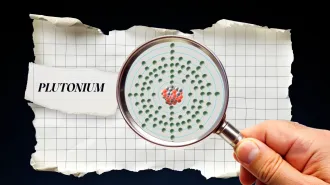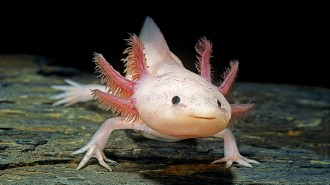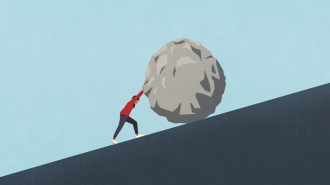Outgoing congressman Rush Holt calls scientists to action

DONE RUNNING New Jersey physicist Rush Holt has decided not to run for re-election but is a proponent of scientists in office.
RushDHolt/YouTube
Rush Holt, central New Jersey’s “rocket scientist” representative, thinks Capitol Hill needs more scientists. He’s leaving Congress at the end of this year, but his eight terms in office have taught him that scientists need to help craft the nation’s laws now more than ever.
Holt joined Congress in 1999, and at one point was one of three physicists there. Fifteen years later he’ll leave the House with just one, Rep. Bill Foster of Illinois. A microbiologist, six engineers and about two dozen medical professionals also hold seats in the House or Senate.
“We need more scientists, more people with training as scientists, in Congress, on town councils, on county commissions until that golden age when everyone can think intelligently about science,” says Holt, a Ph.D. physicist and former assistant director of the Princeton Plasma Physics Laboratory. He says it’s not just about explicitly scientific issues like climate change and energy sources, either. Even voting laws can benefit when legislators think like scientists.
New Jersey Congressman Rush Holt talks about the science of climate change and why he supported legislative action to curb warming during his eight terms in office.RushDHolt/YouTube |
When electronic voting machines first appeared, for example, Holt and other scientists in Congress immediately saw what other politicians didn’t. Without a paper trail, results would not meet a basic standard of science: verifiability. Holt introduced a bill in 2008 to address the problem, and though it never passed nationally, states including California and Ohio did begin requiring paper records.
During his time in office, Holt got a $22 billion investment in new research into the 2009 stimulus package, helped write the College Cost Reduction Act and has been a vocal opponent of climate change denial. He has said that he’s leaving Congress not because of frustrations with its dysfunction, but because there are so many other things he can do — though he isn’t saying yet what his next steps will be.
“People interested in politics should learn science, and people involved in science should learn politics,” Holt says. For now, he puts the onus on scientists. “Scientists probably have greater responsibility than the average citizen to be involved in politics and policy,” he says, because they often have a deep understanding of complex topics. “That responsibility involves more than just voting.”
Q&A with Rush Holt
What are the hallmarks of “thinking like a scientist,” as you’ve often put it?
RH: “Everyone says they want evidence-based thinking, […] but the fact is, scientists are imbued with a reverence for evidence that I don’t think everyone has. Secondly, scientists have a nose for exaggerated or fraudulent claims, things that are just too good to be true. Scientists are really pretty good at doing back-of-the-envelope calculations to see if something is off the wall. Scientists are really good at lots simple things, like thinking about rates and stat reasoning, things you would hope any well-educated person could do, but in fact they often don’t. And then there’s the keystone of science, the idea of verification, so that you don’t accept just one source. And the farther the claim is from accepted wisdom, the more verification you need. Those are things that come naturally to scientists or come from a lifetime of training. And they’re very useful in policy.”
How can we help people get better at thinking like this?
RH: “Fortunately, in recent years, at least in the elementary grades, a lot more students are using what is often called inquiry based science. So they understand that science is not just Latin terminology and complicated techniques. It’s really asking questions so they can be answered and verified empirically. It’s that simple, and that complicated. But kids can do it until we try to tell them, “Oh no, that’s not science. You have to master more techniques and more techniques.” Yes, there are lots of thing you can do by learning these techniques. But that’s not how you learn to think like a scientist.
Does being a scientist make being a politician easier or harder?
RH: “I think the scientists in Congress will tell you that other members think that [the scientists] are really smart. We have this idea that only smart people can do science. So if you’re a scientist you must be smarter than everyone else. And to some extent we’ve taught science that way in school – this is only for the brainy ones and the rest of you need not apply (of course, that does a disservice to everybody). Now obviously, a lot of [politicians] understand that political skill is not just a matter of intelligence. But because they think we’re smart, they sometimes will give us a listen when they might not otherwise.”







